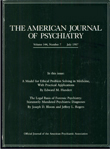Retrospective Review of Treatment Outcome for 63 Patients With Trichotillomania
Abstract
OBJECTIVE: The authors' goal was to assess naturalistic treatment outcome in trichotillomania. METHOD: Sixty-three patients who had been treated in a specialty clinic for trichotillomania over a period of 6 years were contacted. The patients were given paper-and-pencil instruments that assessed current severity of hairpulling, depression, anxiety, self-esteem, and psychosocial functioning. RESULTS: Significant mean improvement was found on measures of hairpulling, depression, anxiety, self-esteem, and psychosocial functioning. Improvement in hairpulling was associated with greater depression at the time of their index clinic evaluation as well as more improvement in depression after treatment. CONCLUSIONS: State-of-the-art behavioral and pharmacological treatments offer substantial clinical benefit to patients with trichotillomania, both in hairpulling symptoms and ancillary measures of functioning.



